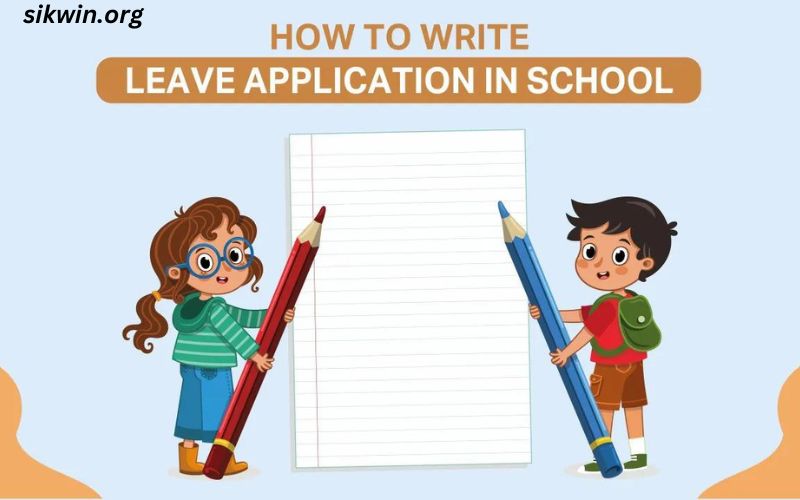As a student, taking time off from your studies can be necessary for various reasons, such as medical emergencies, family events, or personal commitments. However, it is crucial to communicate these absences effectively to your school or college authorities. Writing a leave letter serves as a formal and responsible way to request time off, ensuring that your academic progress is not compromised.
By submitting a well-crafted leave letter, you demonstrate your professionalism, respect for institutional policies, and commitment to your education. It allows your teachers and administrators to plan accordingly, make necessary accommodations, and ensure that you can seamlessly catch up on missed work. Additionally, a leave letter establishes a clear record of your absence, which can be crucial in case of any future inquiries or disputes.
Furthermore, maintaining open communication with your school or college regarding your leave helps to foster a positive relationship with your teachers and the administration. This, in turn, can lead to a more supportive learning environment, where your needs and concerns are addressed in a timely and understanding manner.
Guidelines for writing a leave letter
When composing a leave letter as a student, it is essential to adhere to the following guidelines:
- Timeliness: Submit your leave letter as soon as possible, preferably well in advance of the planned absence. This allows your school or college sufficient time to make the necessary arrangements.
- Clarity: Clearly state the reason for your leave, providing relevant details and supporting documentation, if applicable. Be specific about the dates of your absence and the expected date of your return.
- Professionalism: Maintain a formal and respectful tone throughout the letter. Avoid using casual language or making demands.
- Responsibility: Acknowledge your academic responsibilities and express your commitment to making up any missed work or assignments. Offer to collaborate with your teachers to ensure a smooth transition during your absence.
- Gratitude: Express your appreciation for your school or college’s understanding and support in accommodating your leave request.
Format and structure of a leave letter
A well-structured leave letter should typically include the following elements:
- Heading: Begin with a clear and concise heading, such as “Leave Letter” or “Request for Leave of Absence.”
- Date: Provide the current date at the top of the letter.
- Recipient’s information: Address the letter to the appropriate authority, such as the principal, dean, or head of the department.
- Introduction: Start the letter with a polite greeting and a brief statement of your purpose, such as “I am writing to request a leave of absence from my studies.”
- Reason for leave: Explain the reason for your leave, providing relevant details and supporting documentation, if necessary.
- Dates of absence: Clearly state the specific dates of your absence, including the expected date of return.
- Academic responsibilities: Acknowledge your academic responsibilities and express your commitment to making up any missed work or assignments.
- Appreciation: Express your gratitude for the school or college’s understanding and support in accommodating your leave request.
- Closing: End the letter with a formal closing, such as “Sincerely” or “Best regards,” followed by your name and signature.
Tips for writing an effective leave letter
To ensure that your leave letter is well-received and effectively communicates your request, consider the following tips:
- Research institutional policies: Familiarize yourself with your school or college’s policies and procedures regarding leave requests. This will help you tailor your letter to meet their specific requirements.
- Provide supporting documentation: If your leave is due to a medical or personal emergency, consider including relevant documentation, such as a doctor’s note or a letter from a family member.
- Offer a plan for catch-up: Demonstrate your responsibility by proposing a plan for how you will make up any missed work or assignments during your absence.
- Proofread and edit: Carefully review your letter for any spelling, grammar, or formatting errors before submitting it.
- Follow up: If you do not receive a response within the expected timeframe, follow up with the appropriate authorities to ensure that your leave request has been received and is being processed.
Common mistakes to avoid in a leave letter
When writing a leave letter, it is essential to avoid the following common mistakes:
- Lack of specificity: Vague or ambiguous explanations for the leave request can raise concerns and delay the approval process.
- Unprofessional tone: Using casual or informal language can undermine the seriousness of your request.
- Failure to acknowledge responsibilities: Not addressing how you will manage your academic obligations during your absence can raise doubts about your commitment to your studies.
- Missed deadlines: Submitting your leave letter at the last minute can limit the school or college’s ability to accommodate your request.
- Incomplete information: Omitting critical details, such as the specific dates of your absence or the reason for your leave, can result in delays or the request being denied.
Sample leave letter for a student
Dear [Recipient’s Name],
Leave Letter
[Current Date]
I am writing to request a leave of absence from my studies at [School/College Name] due to a family emergency.
My grandmother has recently been hospitalized, and I need to travel to [City, State] to be with my family during this time. I am requesting a leave of absence from [Start Date] to [End Date], with the expectation of returning to my classes on [Return Date].
During my absence, I will work closely with my professors to ensure that I stay up-to-date with my coursework and complete any missed assignments. I am committed to making up any missed work and maintaining my academic progress.
I appreciate your understanding and support during this difficult time. Please let me know if you require any additional information or documentation.
Thank you for your consideration.
Sincerely, [Your Name] [Your Signature]
How to submit a leave letter to your school or college
The process for submitting a leave letter may vary depending on the specific policies and procedures of your school or college. However, the general steps typically include:
- Obtain the appropriate form or template: Many institutions provide a standard leave request form or template that you can use to structure your letter.
- Gather any required documentation: Depending on the reason for your leave, you may need to provide supporting documentation, such as a doctor’s note or a letter from a family member.
- Submit the letter through the proper channels: Determine the appropriate method for submitting your leave letter, which may involve delivering it in person, sending it via email, or uploading it to a student portal.
- Follow up on the status of your request: After submitting your leave letter, be sure to follow up with the relevant authorities to ensure that your request has been received and is being processed.
Familiarize yourself with your school or college’s specific policies and procedures to ensure that you follow the correct protocol for submitting your leave letter.
Importance of proper communication with teachers and parents regarding leave
Effective communication with your teachers and parents regarding your leave is crucial for several reasons:
- Academic support: By keeping your teachers informed about your absence, they can provide you with the necessary support and resources to help you stay on track with your studies during your leave.
- Parental involvement: Involving your parents or guardians in the leave request process can demonstrate your responsibility and help ensure that your leave is properly documented and communicated.
- Transparency and trust: Open communication with your school or college authorities and your parents can foster a sense of trust and transparency, which can be beneficial for your overall academic and personal development.
- Avoiding misunderstandings: Clear and timely communication can help prevent any misunderstandings or complications that may arise due to your absence.
The impact of regular attendance on academic performance
Maintaining regular attendance is a crucial factor in academic success. Studies have shown that students who have consistent attendance tend to perform better academically compared to those with frequent absences. Some of the key benefits of regular attendance include:
- Improved learning: Regular attendance allows students to fully engage with the course material, participate in discussions, and receive immediate feedback from their teachers.
- Better time management: Consistent attendance helps students develop effective time management skills, which are essential for balancing their academic and personal responsibilities.
- Higher grades: Students with regular attendance often demonstrate higher academic achievement, as measured by test scores, assignment grades, and overall GPA.
- Enhanced social and emotional development: Attending classes regularly can also contribute to a student’s social and emotional growth, as they have more opportunities to interact with their peers and develop a sense of belonging within the school community.
Conclusion
In conclusion, writing a leave letter as a student is a critical aspect of responsible communication with your school or college authorities. By following the guidelines and best practices outlined in this article, you can ensure that your leave request is handled in a professional and transparent manner, minimizing the impact on your academic progress.
Remember, effective communication with your teachers and parents regarding your leave can help foster a supportive learning environment and demonstrate your commitment to your education. Additionally, maintaining regular attendance is strongly correlated with academic success, so it is crucial to balance your personal and academic responsibilities.
If you found this guide on writing a leave letter as a student helpful, be sure to share it with your classmates or anyone else who may benefit from this information. Remember, responsible communication is key to academic success, so don’t hesitate to reach out to your school or college authorities if you need to request a leave of absence.





I am not real superb with English but I get hold this really easygoing to read .